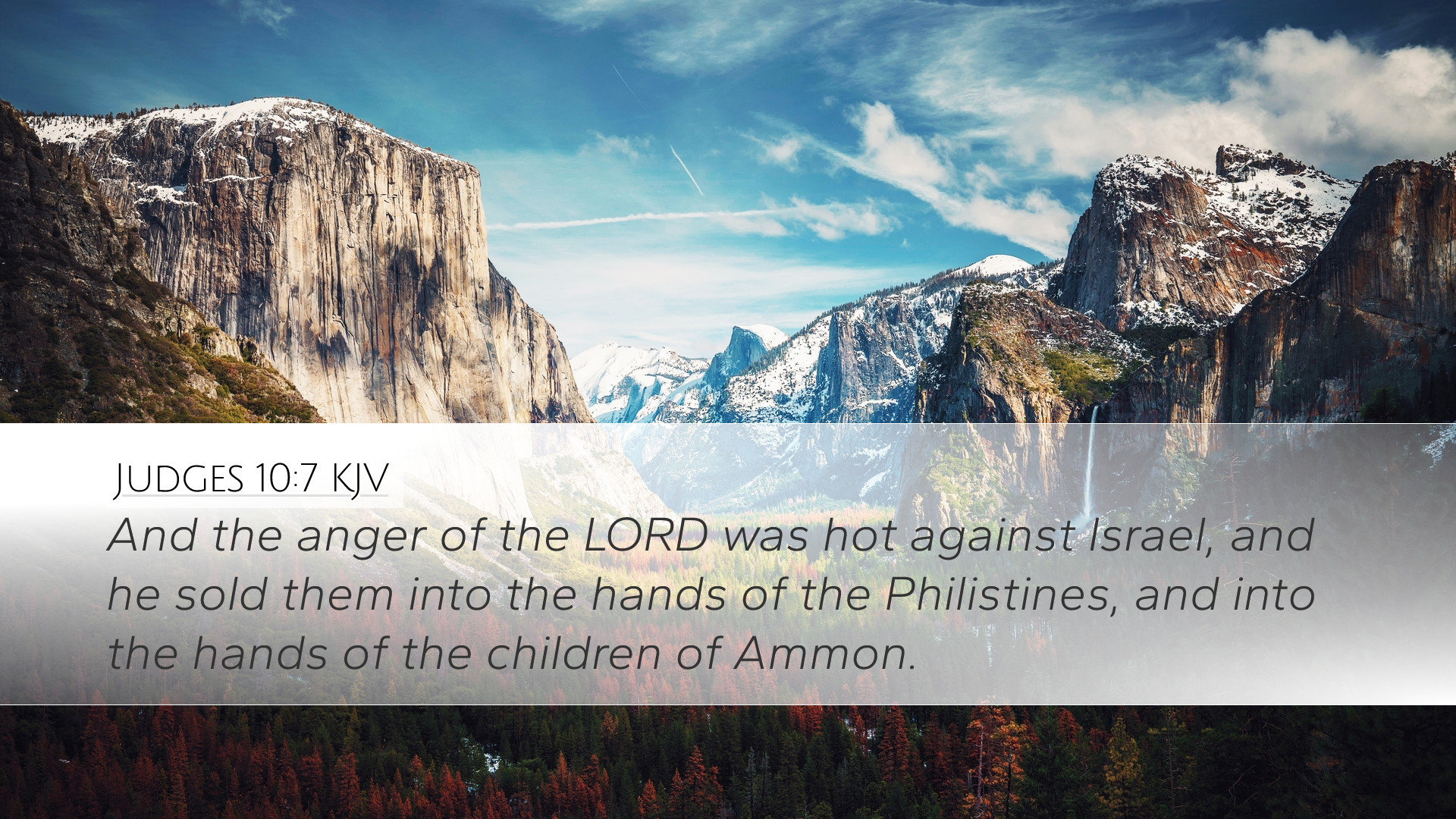Old Testament
Genesis Exodus Leviticus Numbers Deuteronomy Joshua Judges Ruth 1 Samuel 2 Samuel 1 Kings 2 Kings 1 Chronicles 2 Chronicles Ezra Nehemiah Esther Job Psalms Proverbs Ecclesiastes Song of Solomon Isaiah Jeremiah Lamentations Ezekiel Daniel Hosea Joel Amos Obadiah Jonah Micah Nahum Habakkuk Zephaniah Haggai Zechariah MalachiJudges 10:7
Judges 10:7 KJV
And the anger of the LORD was hot against Israel, and he sold them into the hands of the Philistines, and into the hands of the children of Ammon.
Judges 10:7 Bible Commentary
Commentary on Judges 10:7
Verse Context: Judges 10:7 reads, "So the anger of the LORD was hot against Israel, and he sold them into the hands of the Philistines and into the hands of the children of Ammon." This verse is pivotal as it reveals God's displeasure with Israel and the consequences of their rebellion.
Introduction
This commentary seeks to explore the theological implications of Judges 10:7 by drawing insights from renowned public domain commentators. Understanding this passage provides crucial insights into the character of God, the concept of divine justice, and Israel's repeated cycles of sin and redemption.
Divine Anger and Human Rebellion
Matthew Henry's Commentary: Henry points out that God's anger is a response to repeated unfaithfulness among His people. The phrase "sold them" illustrates not merely abandonment but a form of divine judgment, where God allows foreign nations to dominate Israel as a consequence of their disobedience.
Albert Barnes: Barnes expounds on the nature of God's anger, emphasizing that it is not capricious but rather a justified response to Israel's sin. He writes that God's "selling" them signifies a withdrawal of divine protection and favor, leading to subjugation by their enemies as a corrective measure.
Adam Clarke: Clarke adds that this punishment was not just physical oppression but also spiritual degradation. Israel's recurring sinfulness stirred the wrath of God, prompting Him to allow the Philistines and Ammonites to assert power over them as a means to bring Israel to repentance.
Understanding Divine Justice
The concept of divine justice is central to this verse, revealing how God uses circumstances to guide His people back to righteousness.
- Moral Order: Henry illustrates that God's anger serves as a reflection of a moral universe where sin has consequences. He asserts that divine justice operates on the principle that rebellion against God always leads to inevitable suffering and chaos.
- Purposeful Suffering: Barnes writes of this suffering: God permits trials and tribulations not as arbitrary punishment but to lead His people to recognize their need for Him. This corrective suffering can lead to genuine repentance and restoration.
- Restorative Intent: Clarke points out that divine anger is not devoid of mercy. Instead, it often seeks to bring Israel to a realization of their state, encouraging them to return to their covenant relationship with God.
Historical and Cultural Implications
Contextual Background: To understand this verse, one must consider Israel's historical context during the time of the Judges. As Israel oscillated between faithfulness and idolatry, they faced the inevitable consequences of their choices.
Military Oppression: The Philistines and Ammonites were not just enemies but symbols of the moral and spiritual decay that had infiltrated Israel. Henry notes that God used these nations as instruments to chastise Israel for their idolatrous practices and unfaithfulness.
The Cycle of Sin and Redemption
This verse is part of a larger narrative that illustrates the cyclical pattern of sin, punishment, repentance, and deliverance that characterizes the Book of Judges.
- Sin: Israel's departure from God is the root cause of their predicament, illustrating the theme of human depravity.
- Consequences: The ensuing oppression serves as a direct result of their choices, affirming that divine justice is a reality in the spiritual journey.
- Repentance: While the verse reflects anger, it also foreshadows the subsequent cry for deliverance and God's unwavering mercy in response to true repentance.
Theological Reflections
God's Nature: This verse allows for reflection on God's nature as both just and merciful. It challenges readers to consider how God’s anger is balanced with His love, ultimately leading to restoration when His people return to Him.
Contemporary Application: Pastors and scholars are encouraged to draw parallels between Israel's plight and contemporary issues of sin in the church today. Just as Israel faced the consequences of their sins, the modern church must be vigilant against similar patterns of rebellion against God’s will.
Conclusion
Judges 10:7 serves as a profound reminder of God’s justice and faithful commitment to His covenant people. It encourages believers to recognize the seriousness of sin, the reality of God’s wrath, and the hope of repentance leading to restoration.
The commentaries from Henry, Barnes, and Clarke bring rich insights that not only elucidate this specific verse but also encourage a broader understanding of God’s character and the importance of faithfulness in the believer’s life.


